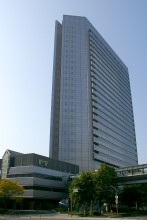
Matsushita (or Matsushita Electric Industrial Co., Ltd.) refers to a multinational Japanese electronic manufacturer that was founded in 1918, and enjoyed significant growth following the Japanese defeat in World War II. The company was intrinsic with the economic boom Japan experienced between the 1950s and the 1980s. In 2008, the company's board voted in favor of renaming itself 'Panasonic Corporation' in order to fall in line with its globally recognized brand name 'Panasonic'.
Having survived, and indeed flourished, through the challenging economic and culture situations that occurred in the second half of the twentieth century, Matsushita can be seen as a good example of how Japanese business adapted to remain competitive from the post-war boom through to the early 90s slump
Post-War
Following the defeat to the allied forces in World War II, Japan was faced with a huge challenge in reestablishing it's pride and economy. Collectively, the Japanese were able to rebuild their country to become one of the most powerful nations in the world, and all in under 60 years! Much of this regeneration was attributed to the Confucian belief system that encouraged high moral conduct, loyalty, appreciation of network involvement and honesty in their dealings with each other.
This code of conduct encouraged employees to be fully dedicated to their employer and show loyalty to their superiors; in return superiors were expected to treat their employees with respect and reward them for their loyalty.
During this period, Matsushita was able to retain personnel through extreme growth, which meant skills and knowledge were also retained, and employees even encouraged their sons and daughters to join their companies, passing on training, knowledge and work ethic. Importantly, this encouraged a sense of family loyalty to the brand. This approach was the foundation of rebuilding the Japanese economy in the decades that followed the war.
Cultural Changes
Towards the end of the 80s however, Japan began seeing a shift in culture. Much of this can be attributed to increased wealth, and changing attitudes of younger workers and their lifestyle. The situation came to a head with the economic bursting of the Japanese economy in 1989 which left companies like Matsushita needing to make difficult choices.
The Confucian values and loyalty that had seen the company grow between 1950 and 1980 was now identified as a hindering factor that made it difficult for the company to remain competitive. Many of the changes required were in the human resources department, with the company struggling to attract young and talented employees, and the outdated 'honorable' approach of senior staff meant that they were reluctant to make decisions that contradicted their traditional values, even if they were the more profitable route to take.
The struggle that Matsushita faced was shared by Japanese culture as a whole during this period. Traditional values that had built Japan back up from the ruins of war were now being discarded for the new, wealth-driven approach that was undoubtedly necessary for the country to compete economically.